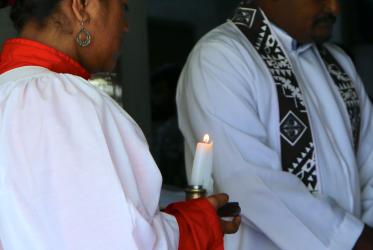Preamble
On 27-29 May 2015, 75 participants gathered in Geneva for an international conference on peace and security in the Democratic Republic of Congo (DRC), at the invitation of the World Council of Churches (WCC) [Commission of the Churches on International Affairs (CCIA)]. Participants represented a wide spectrum of churches and church-related organizations both from within DRC and from the wider global ecumenical fellowship, as well as partners from civil society and the UN.
Among the participants were 19 Congolese coming from DRC. 20 others had been expected, but were denied or did not obtain visas in time to enable them to participate. We greatly regret that the participation of Congolese young people was especially impeded by the denial of visas.
We gathered at an important moment for the people of the DRC, anticipating provincial and municipal elections this year and a presidential election in 2016, and at time when recent violence in Beni and the arrival of refugees from Burundi, have given unsettling signs of renewed instability in the country and region.
Through worshipping and praying together during this conference we strengthened our ecumenical fellowship and drew inspiration and courage from the faith we share for the challenges ahead.
Purposes
The purposes of this conference included raising greater awareness of the current situation in the DRC, developing a common understanding of the various threats and challenges faced by the Congolese people, and mobilising partners for on-going international ecumenical accompaniment of churches and partners in DRC. In the context of this wider ecumenical accompaniment of churches and partners in DRC, the conference also sought to promote stronger ecumenical collaboration in preparing for the forthcoming election processes in DRC, and international ecumenical monitoring and observation of the 2016 presidential election.
Observations and rationale
The DRC has been blessed by an abundance of natural resources. But that abundance has in many ways become a burden, as human greed drives unjust exploitation of minerals and living resources, treats other human beings as expendable commodities, and pillages the earth and rapes its inhabitants. Such sinful attitudes and actions have resulted in pervasive violence and injustice.
Violence results in the destruction or denial of life. We follow a Lord who brings abundant life, and we share God’s dream of a world where all human beings live full and generous lives. The ancient dream includes fullness of life for all humanity and repair of the world’s brokenness.
As people on a pilgrimage of justice and peace, we meet Jesus wherever we travel – in children who have been forced to serve as soldiers, people who have been raped, who are hungry and displaced. All are equal members of the body of Christ, and the gift of their lament needs to be heard as a rallying cry for all the churches of DRC, and for their partners within and beyond the country.
We were deeply moved by the voices of the newer generations, who are becoming leaders yearning for peace. Former child soldiers are serving as peace mentors to younger ones, young women are finding their voices in support of their abused sisters, and others are prodding older leaders for justice and right relationship with the rest of creation.
God has also blessed the DRC with an abundance of human resources and relationships of solidarity. The churches have abundant opportunity to build more effective partnerships to succor and support the wounded and abused, to advocate for justice that addresses widespread impunity, and to teach their members about the equal dignity of all human beings, created in the image of God. In their work of repairing the breach, churches have a deep responsibility to honour their differing gifts and repent of competitive attitudes and the lack of love. The people of DRC need their solidarity and leadership toward the vision of the Reign of God here on earth – a society of peace because there is justice for all.
The churches and their members are meant to be salt of the earth. Mixed with the water of baptism, salt becomes an agent of solution, cleansing and healing. The wounds that so afflict the DRC need tender washing – and we pray that the churches, together with other people of faith, may begin to dissolve the pain and water the seed of new life, resurrection born of death in Christ.
Churches within and beyond the DRC can and must partner for more effective modeling of the body of Christ – working together to build up the whole, respecting the dignity of each and every part, and following Jesus’ vision rather than our own more narrow ends. That vision heals the wounded, grieves with the dying and their loved ones, feeds the hungry, liberates the oppressed and sets prisoners free, encourages the poor and frightened, and teaches God’s ways of justice and peace.
Elections are a tool for progress towards the vision of a society of justice and peace. However, the process is fundamentally empty without a transcendent vision of a future that is healed and whole. Elections must serve a vision where all people can live together in communities that are inclusive and without discrimination. None can be whole unless all are welcomed and affirmed as daughters and sons of God, equally deserving of the riches of creation and the full dignity of the One whose image they bear.
Commitments and recommendations
We call for closer collaboration among the churches of the DRC, to address the many issues we have discussed in this consultation, including environmental protection, management of natural resources, and better regulation of the extractive sector; human rights and humanitarian response; sexual and gender-based violence and HIV and AIDS; peacebuilding and reconstruction; corruption and good governance.
As important means of promoting action on these issues and of moving towards realizing the vision of the DRC reflected in the provisions of the national Constitution, churches are called to inform, teach and engage their members in reflection and action, and to work for peaceful elections – at both provincial and national levels – that can result in political leadership committed to responding to these challenges with integrity and accountability.
To this end, we commit to strengthening and widening our ecumenical cooperation for justice and peace in the DRC, and propose the establishment of a suitable structure or process for the purpose of sharing and consolidation of existing initiatives by the churches and related organizations or networks, and in order to consider new ecumenical initiatives on the issues we have discussed. Given the nature and dimensions of the challenges confronting the DRC, an effective ecumenical response demands the common prophetic voice and joint action of all churches in the country. Therefore, through such a structure or process, we will seek engagement with all church families in the DRC, so that we may speak and act together in addressing these challenges. The proposed structure or process should facilitate an inclusive and regular interaction between churches in the DRC and their ecumenical partners nationally and internationally, in order to help strengthen the prophetic voice of the churches in addressing the issues that affect the life of the Congolese people and God’s creation.
Through this structure or process, and through the church families and networks participating in it, we commit to ensuring that the experiences and perspectives of all parts of the country are shared, including the eastern DRC where many of the problems we have discussed are concentrated, and that women and youth are full and equal participants.
We commit to especially focussing on the concerns of young people in the DRC, including education and employment, training in non-violence and peacebuilding, and preventing gender-based violence and harassment, and to support young people as leaders of social transformation.
We call on all international partners of the churches of the DRC to participate in and support stronger and wider ecumenical cooperation for justice and peace in the DRC, including through the proposed structure or process, in order to promote better coordination and collaboration in our collective efforts for the purposes we all share, and to avoid fragmentation and competition that can only weaken our potential impact.
In light of the forthcoming elections in the DRC, we encourage coordination of all church-based efforts to promote reflection, formation and capacity building in Congolese society in order to ensure that not only are the election processes peaceful, but that they also produce committed, empowered and accountable political leadership for justice and peace in the DRC in accordance with the vision and commitments described in the national Constitution.
We will also work through the Commission of Integrity and Electoral Mediation at national and provincial levels to seek closer collaboration with ecumenical and interfaith partners to this end.
We invite international partners under the leadership of WCC, together with the All Africa Conference of Churches (AACC), the Fellowship of Christian Councils and Churches in the Great Lakes and Horn of Africa (FECCLAHA) and the churches of the country, to work together in undertaking an ecumenical initiative to accompany the churches of the DRC during the period of the 2016 presidential election, and to support the role of the churches in community leadership in the post-election period.
Closing word
We the participants in this conference depart from one another with the conviction that the gospel message and African cultural values impel and empower the churches of the DRC in their critical prophetic role for justice and peace in DRC. We leave feeling that through the encounter, the fellowship, and the sharing of information and insights the Psalm 133 vision materialized among us. How good it is indeed for sisters and brothers to be together in unity, for there God sends God’s blessing.



